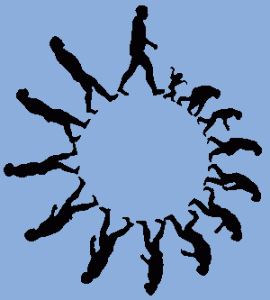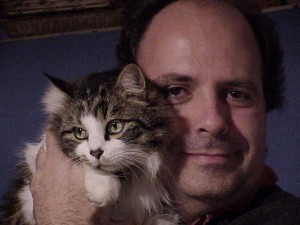 (This post is part of a pact I made. Click here for the full story.)
(This post is part of a pact I made. Click here for the full story.)
Meet Cindy. As you read this post, keep in mind that as I wrote it, I flipped back and forth through her six-page resume.
Starting with her education, Cindy has a Bachelor’s of Engineering from Auckland University. A program which she completed in three years, instead of four, because she was awarded direct entry into year 2. That’s because from highschool she graduated in the top 1% in New Zealand. She then went on to complete a Masters of Engineering Science in Biomedical Engineering – and graduated top 3 of her year. And as of 2002 she can be addressed as Dr. Shin-Yi Lin because she has a PhD in Neuroscience. As of today, Dr. Shin-Yi Lin has published more than 45 papers and has been an invited presenter at conferences and symposiums around the world, including Japan, Australia, Europe and Canada. Two years ago Dr. Shin-Yi Lin became a lecturer at the faculty of medicine of the University of New South Wales in Sydney, Australia. She teaches fundamentals of neuroscience and neuromuscular rehabilitation. In July she was named Senior Lecturer.
Cindy is 34.
Even for a high-achiever like Cindy, it was not immediately obvious to her what she was put on this earth to do.
As she shared with me, because she received a ‘typical Asian’ education in Taipei, since the time when she started her schooling, she’s been driven by the belief that academia and being a top student are what matter most. Inspite of her upbringing, after her first job in academia, she felt that she needed to tone down the pressure in her life. In her own words: “because of how young I was when I first got my research assistant job, all my colleagues (professors and nuerologists) were at least 10 years older than me. I felt I had to catch up all the time, in terms of professional aspect as well as the overall maturity. This invisible force or peer pressure has really been a major catalyst throughout my life.”
She decided to change courses and moved into the business world. Albeit related to engineering, she held several jobs outside of academia. Including computer programming, doing a BBC production, developing multimedia and selling biotech solutions.
Even then things did not feel quite right. In her words: “I was struggling to move into the business world and away from the research world…with my given back ground it was difficult…without an MBA or any commercial experience…”
While staying open to the possibility of some day branching back into business,
Cindy decided to go back to academia.
Evidently it was through trial and error that she finally found her career nirvana. As she wrote to me: “So far I would say, all (these jobs have been) influential (and have) shaped me….Yet now I think the most influential job is…as an academic lecturing…because I clearly influence all of my students and this to me is a huge responsibility.”
Note to self: What has been your most influential job? What does that tell you about your passion?
Lets be clear on this. It’s not Cindy’s degrees or achievements that I found surprising. Or how smart and knowledgeable she is. I know that anyone can achieve anything that they set their mind to.
Make a mental note of that.
What drew me into her story was how down to earth and approachable Cindy is. I met her during my Sunday morning swim at the university where she teaches. She was wearing a bathing suit and flip-flops, casually carrying around a bottle of water. To me she looked like one of the students. For no real reason we began to talk. She asked me what I did. I told her about my blog – and recent book project. I reciprocated with my own curioisity. And she briefly told me that she was a lecturer of neuroscience. She left it at that and we began to talk about star signs. She’s a libra, I’m a scorpio.
She shared her path with me only after I asked. Being that the topic of neuroscience is one of my own passions, I wanted to know more about what exactly she taught. I now feel lucky that I dug deeper. It feels like I lifted the lid to a wonderful world full of light.
It was not because we were rushed that at first she did not ramble off her achievements. In time I found out it’s because Cindy feels so comfortable in her own skin, that she doesn’t have a need to seek approval for what she’s done – or achieved. In her eyes, she’s living the life that she is meant to live. To her it doesn’t feel grandiose – it’s simply her life. In line with her simplicity, she confessed (almost apologetically) that her child-hood dream was to become a kinder-garden teacher. As she wrote to me: “I can never take my eyes off children and I love to play with them.”
Note to self: Achieve what matters to you. How are you meant to be living?
For someone who has looked at brain scans longer than most of us have, Cindy is an extremely extroverted person. “…I love people and I am very blessed to work with some amazing people who have great integrity and I have been blessed with excellent mentors all along my career.”
Note to self: Are you surrounded by amazing colleagues? People who are worthy of imitation?
It’s refreshing to hear it from a scientifically-minded person like Cindy that the only constant is change in this world. “Therefore you can prepare but… the truth is for me I don’t even know myself when it happens…I do plan things in short terms but hardly long terms, since I know you really don’t know what will happen tomorrow…How would I know if I change things will be better?”
Even so Cindy has taken chances and has changed lanes. In her words: “To me experience = you have DONE it before…and it became your experience. It could be great, it could be wrong, it could be anything but it’s all part of your own experience and the most important thing to me is, you did take the lesson out of the experience and you learn from it. I am a great believer in for things to happen you need ‘the right timing at the right place with the right people’ otherwise the same thing can have a completely different outcome.”
Make a mental note of that.
In search for more answers, I asked Cindy to tell me what has worked for her and what hasn’t throughout her career.
In her humble way she wrote: “Woops, this one is hard, but I am giving it my best shot…What worked? My family and friends and colleagues who supported me throughout the years…What hasn’t worked for me is I wait too long…. I wait for things rather than go and get them… this leads me to answer what would I do differently? I would love to be more proactive and less conservative… I regret that I didn’t believe in myself more before… I wish I could be more FOCUSed and make my dreams come true!”
Reader, make a mental note of that!
Brain scan photo credit: click here.
Cindy chose the underwater shot.
 Siendo que lo único que no cambia es el cambio – resistir el cambio resulta tan útil como intentar resistir la fuerza de la gravedad. Así como la fuerza de la gravedad nos mantiene los pies sobre la tierra y hace difícil caminar de lado sobre las paredes, la fuerza del cambio hace difícil la permanencia – y que las cosas sean igual a como eran antes.
Siendo que lo único que no cambia es el cambio – resistir el cambio resulta tan útil como intentar resistir la fuerza de la gravedad. Así como la fuerza de la gravedad nos mantiene los pies sobre la tierra y hace difícil caminar de lado sobre las paredes, la fuerza del cambio hace difícil la permanencia – y que las cosas sean igual a como eran antes.  Buscando quitarme la reputación de
Buscando quitarme la reputación de  Es de esperarse. Habrá cosas en tu trabajo que se sentirán tan incomodas como caminar con una piedra dentro del zapato.
Es de esperarse. Habrá cosas en tu trabajo que se sentirán tan incomodas como caminar con una piedra dentro del zapato. Curioso como la palabra
Curioso como la palabra  Si funciona – cámbialo.
Si funciona – cámbialo. 



